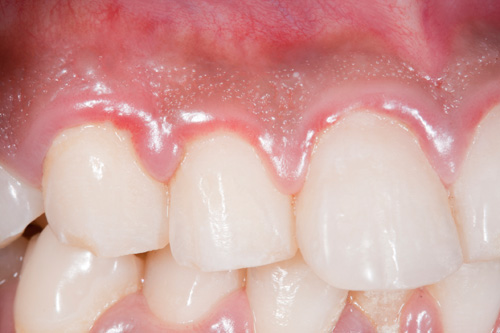Your Oral Health Affects Your Overall Health
Periodontal disease, usually called gum disease, is a silently-destructive infection associated with about 500 different kinds of germs in your mouth that can also infect your body’s vital organs.
The latest results show, more than 60 million Americans show signs of periodontal (gum) disease, a chronic bacterial infection that breaks down the gums and bone supporting your teeth. When gum disease advances, waste products from the bacteria slowly destroy your gum tissue. Soon, your gum tissues are breached and bacteria are free to enter your body’s circulatory system. These dangerous invaders trigger an inflammatory reaction in vulnerable areas of the body. For “at risk” patients, this negative factor might be the element with a complicating effect on their pre-existing medical conditions.
Other studies show that medicine for a variety of illnesses including cardiovascular disease, pulmonary disease such as emphysema or COPD, diabetes, hip replacement, kidney disease, cancer, rheumatoid arthritis, and pregnancy could be hindered by germs from periodontal disease.

The Signs and Symptoms of Periodontal Disease:
• Bleeding gums after brushing
• Blood on your floss after flossing your teeth
• Painful, shiny red or puffy gum tissue
• Loose and/or wobbly teeth
• Gums receding around the teeth
• Chronic offensive breath (halitosis)
• Pus or white film between the teeth
• Pain when you chew or bite on something
• Recent change in your bite
• Spaces that have appeared between teeth
• Food “packing” into your gums

Dentists Are Now Recommending Periodontal Therapy To Stop Heart Disease
By allowing Dr. Cameron to guard against gum disease, you are aggressively lowering your odds of developing cardiovascular problems.
Studies have shown that adults with gum disease have higher odds of also having coronary artery disease than those who don’t. Researchers believe that bacteria being dispersed by chronic oral infections can spread through the bloodstream and have a contributing effect on disease in the heart and other parts of the body.
Since the year, 2000, recurring studies have determined that there is a strong link between periodontal disease and coronary heart disease. One result of unchecked periodontal disease is the loss of teeth. After the gums have been diseased long-term, your teeth can wiggle out.
Researchers in Finland decided to look for an association between the number of missing teeth in a person and the rate of diagnosed heart disease in the group. They looked at almost 1500 men between the ages of 45 and 64. Their research revealed that those men with a higher number of missing teeth from chronic periodontal disease also had a higher incidence of heart disease. Their conclusions? Gum disease raises the danger of heart attack by as much as 25 percent. It increases the occurrence of having a stroke by a factor of 10.
With Periodontal Disease, Each Breath Could Be A Risk To Your Lungs
Over 500 kinds of bacteria found in inflamed gums can also get into your saliva. With each breath, the air picks up droplets of saliva to keep your lungs moist. To see this for yourself, hold a mirror about two inches from your mouth and slowly breathe out. You’ll see a fog develop on the mirror. Now, imagine those little droplets are pulled into your lungs where they, and their cargo of bacteria, fall upon the mucosal lining.
This warm, moist paradise is where the little critters set up shop and induce irritation and inflammation that may start the next bout with respiratory disease like emphysema, bronchitis, pneumonia, and chronic obstructive pulmonary disease. On top of that, if the individual is are currently ill with any of these diseases, theinflammatory bacteria might interfere with the effectiveness of any medication you’re taking.
Diabetes Brought On By Periodontal Infection
While adults with diabetes are known to be at risk for gum disease, we didn’t know which came first, the diabetes or the periodontal disease. In 1993, scientists at Columbia University’s Mailman School of Public Health studied over 9,000 participants who didn’t have diabetes. By the end of the study, about 800 of of the 9,000 went on to develop the disease. The researchers found that individuals with elevated levels of periodontal disease had twice the odds of getting diabetes within 20 years, even after adjusting for age, smoking, obesity and diet.
According to Dr. Demmer, associate research scientist in the Department of Epidemiology at Columbia University’s School of Public Health, “After twenty years, we can come to the conclusion that individuals who had gum disease had a significantly elevated chance of getting Type 2 diabetes sometime later in life when we compare them to those without periodontitis.”
What This All Means To Dentists
Yesterday, dentists strived to save your teeth through regular dental care. From now on, there is a broader dimension to dental care. If you have an inflammatory condition like periodontal disease, you are more at risk for more serious systemic problems, whether it’s heart problems, diabetes, or rheumatoid arthritis. From now on, as we manage the health of your teeth, we’re not just saving your teeth, which in itself is a sound objective, we might just be saving your life as well.
Dr. Cameron concludes, “It is not enough anymore to just keep an eye on at-risk areas in the gum tissue. Rather, aggressively controlling periodontal disease will become a critical action step in preserving and improving our patients’ overall health and their enjoyment of life. In fact, it will mean that if our patients’ teeth and gums are not healthy, we can assume that they are not healthy overall.”
Contact Us
- Romie Lane Dental Group
- Soraya Cameron, DDS
- 770 E. Romie Lane
- Salinas, CA 93901
- (831) 424-3035

